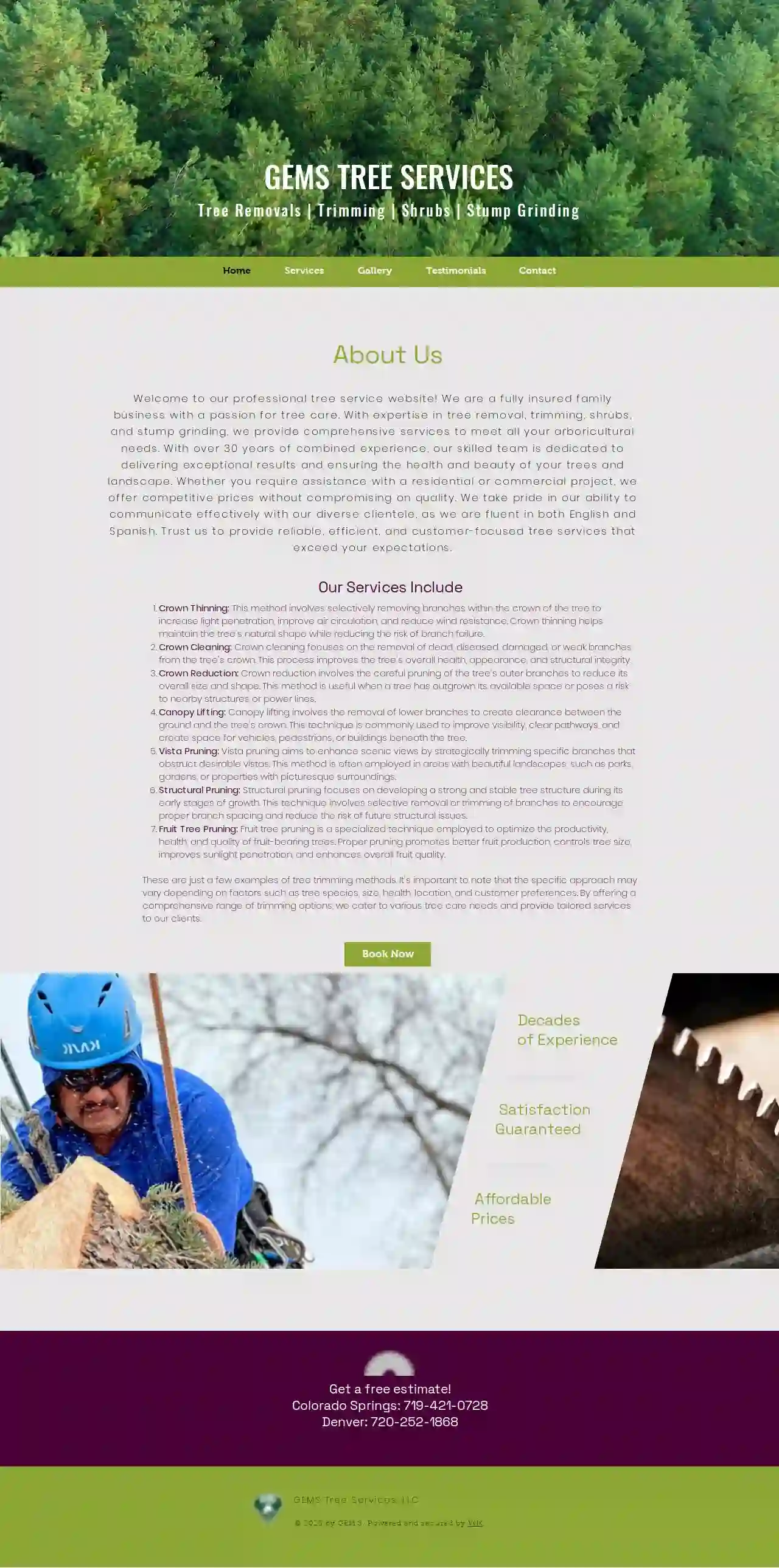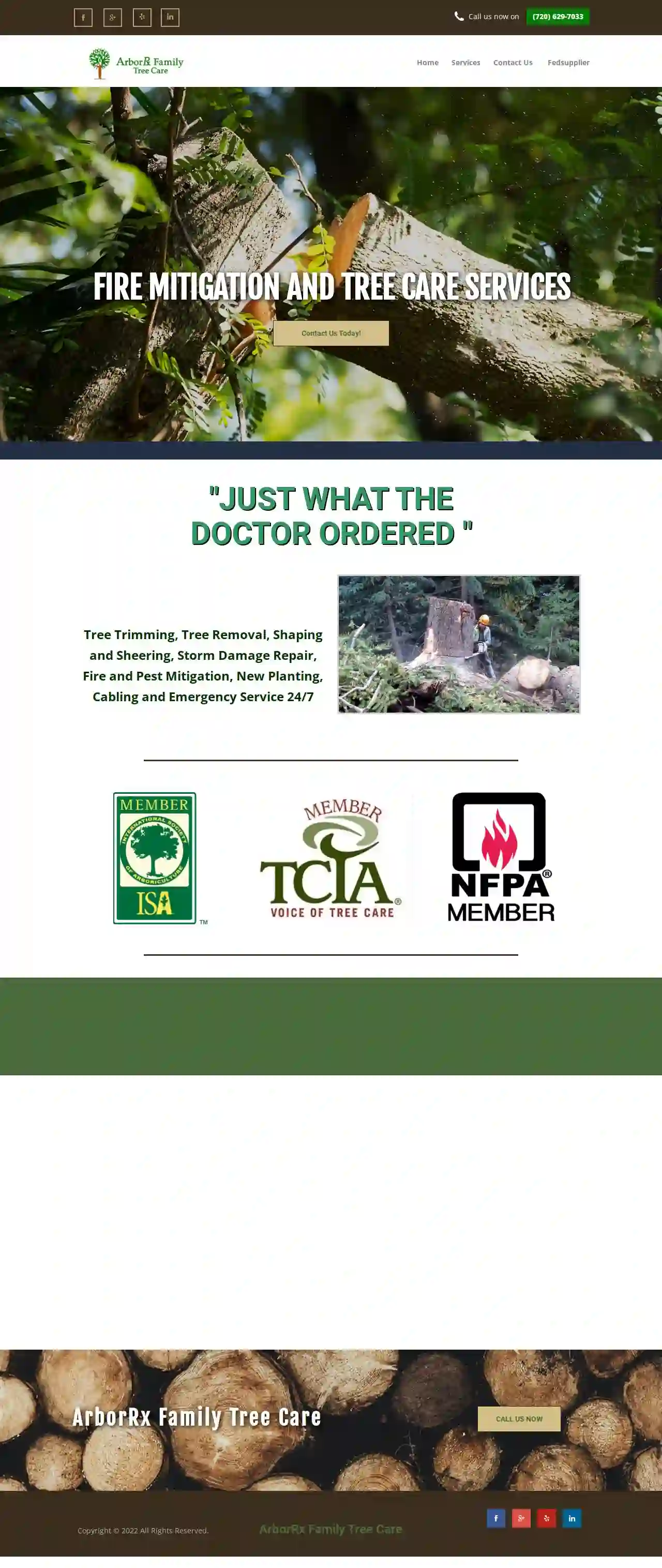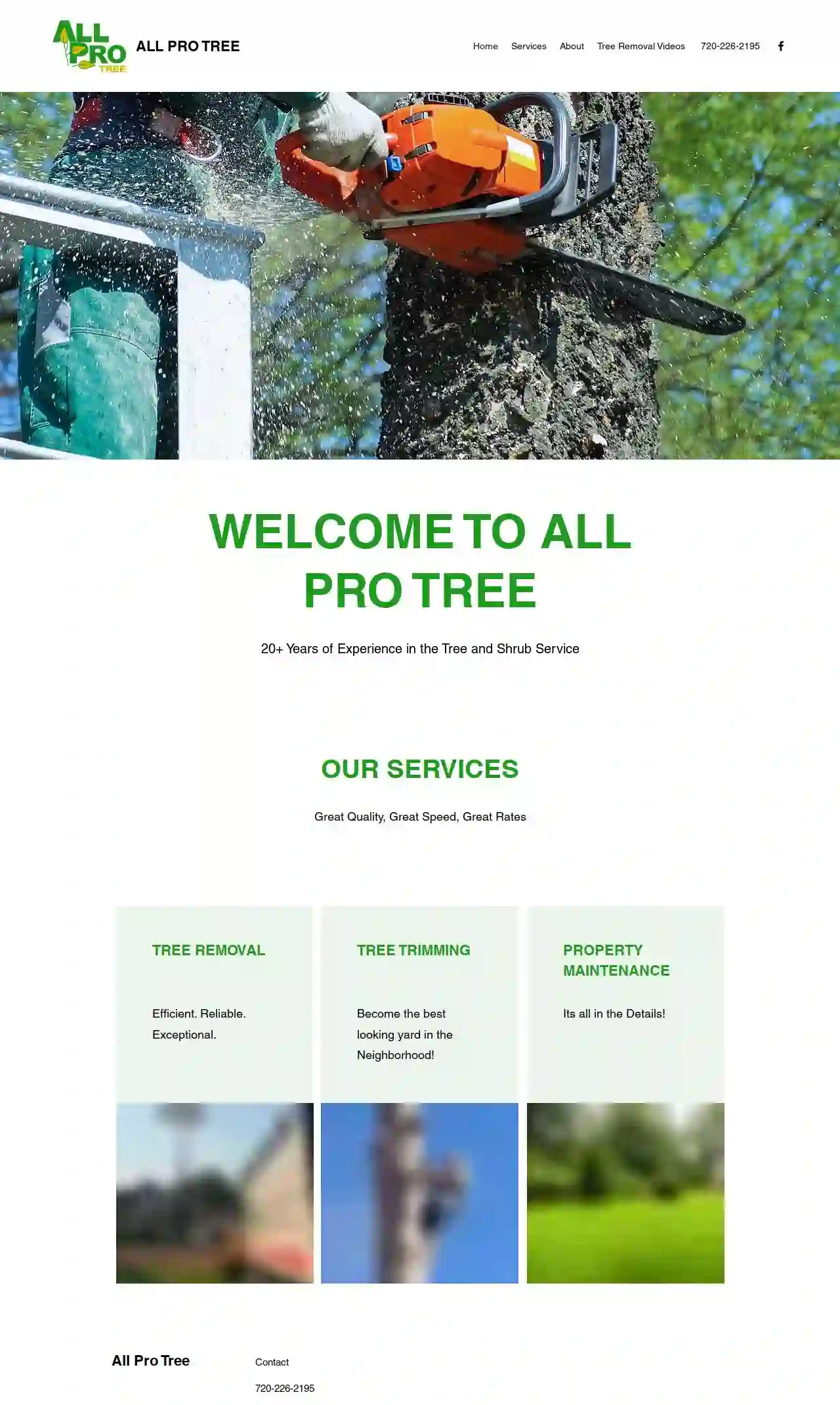Tree Service Berkley
Find the best Tree Care in Berkley
Get up to 3 Tree Services quotes for your project today! Compare profiles, reviews, accreditations, portfolio, etc... and choose the best deal.

Gems Tree Services
531 reviews1234 Tree Lane, Suite 100, Colorado Springs, 80919, USGEMS TREE SERVICES is a fully insured family business with a passion for tree care. With expertise in tree removal, trimming, shrubs, and stump grinding, we provide comprehensive services to meet all your arboricultural needs. Our skilled team is dedicated to delivering exceptional results and ensuring the health and beauty of your trees and landscape.
- Services
- Why Us?
- Accreditations
- Our Team
- Testimonials
- Gallery
Get Quote
Fir Sure Arbor Pro
4.938 reviewsNo address found, No city found, No code found, USFir Sure Arbor Pro is a Limited Liability Company (LLC) that is fully licensed and insured. The managing member, Jeff Baker, is an ISA (International Society of Arboriculture) Certified Arborist as well as an ISA Tree Worker Specialist who offers his tree knowledge, experience, skills, and talents to residential and commercial property owners to address their tree care needs. He has been in arbor related industries for nearly a decade. Jeff works closely with clients to better understand their needs and exceed their expectations.
- Services
- Why Us?
- Accreditations
- Our Team
- Gallery
Get Quote
Scarlett Oaks Tree Care
56 reviews1234 Elm Street, Suite 101, Denver, 80209, USScarlett Oaks Tree Care is a licensed and insured tree service company based in the Greater Denver Area. They offer a variety of services including tree pruning, removal, crown trimming, sprays, and fertilizers. They also provide plant health care, emergency work, and education. The company has been in operation since 2015 and has received positive testimonials from clients.
- Services
- Why Us?
- Accreditations
- Our Team
- Testimonials
- Gallery
Get Quote
Denver Stump Company
52 reviewsEnglewood, CO, United States, PO Box 2383, 80150, USDenver Stump Company is a locally owned and operated stump grinding company in Denver, CO. We provide premium stump grinding services to all of our clients in the Denver, CO area. With hundreds of successful projects under our belt, we can proudly say that we are one of the most trusted stump service companies in Denver, CO.
- Services
- Why Us?
- Accreditations
- Our Team
- Testimonials
- Gallery
Get Quote
Arbordale Land & Tree Services
4.36 reviews123 Maple Street, Beverly Hills, 90210, USDillon Morse is a leading provider of high-quality, custom-made furniture. With a focus on sustainability and durability, Dillon Morse offers a wide range of products designed to meet the needs of both residential and commercial clients. Their commitment to excellence in craftsmanship and customer service sets them apart in the industry.
- Services
- Why Us?
- Accreditations
- Our Team
- Testimonials
Get Quote
ArborRx Family Tree Service
4.943 reviews1234 Elm Street, Suite 100, Denver, 80209, USArborRx Family Tree Care specializes in fire mitigation and tree care services, including tree trimming, tree removal, shaping and sheering, storm damage repair, fire and pest mitigation, new planting, cabling, and emergency service 24/7. They emphasize the importance of fire mitigation, home ignition zone, wildland urban interface, and home hardening.
- Services
- Why Us?
- Accreditations
- Our Team
- Testimonials
- Gallery
Get Quote
Lumber Jack & Jill LLC
4.768 reviews1234 Main St, Fort Collins, 80521, USLumber Jack & Jill Tree Service offers total tree care! From small tree pruning to large tree removal, we can do it all. We provide service throughout Northern Colorado, including Fort Collins, Wellington, and Loveland. Call us today to get a free quote on all of the following services:
- Services
- Why Us?
- Accreditations
- Our Team
- Testimonials
- Gallery
Get Quote
All Pro Tree & Shrub
3.113 reviews1234 Elm Street, Suite 101, Denver, 80210, USAll Pro Tree is a professional tree and shrub service with over 20 years of experience. Our team offers a variety of services including tree trimming, tree removal, shrub trimming, storm damage repair, tree planting, stump removal, and property maintenance. We are dedicated to providing great quality, speed, and rates to ensure customer satisfaction.
- Services
- Why Us?
- Accreditations
- Our Team
- Testimonials
- Gallery
Get Quote
Colorado Tree Care Service
5266 reviewsTomball, USHigh Quality - Best Service - Years of Experience. Senior And Military Discounts Available. Available Thru Hurricane Season!
- Services
- Why Us?
- Gallery
Get Quote
Healthy Little Trees
514 reviewsFort Collins, CO, 80521, USHealthy Little Trees is a local business based in Fort Collins, Colorado, specializing in tree care and urban farming. The business is owned and founded by Lance Schultz, an ISA certified arborist with a passion for ecology. Healthy Little Trees aims to assist clients in creating and maintaining sustainable outdoor living spaces, focusing on tree pruning, removal, and EAB treatment, as well as pesticide applications and small urban farming projects.
- Services
- Why Us?
- Accreditations
- Our Team
- Testimonials
- Gallery
Get Quote
Over 16,467+ Arborists in our network
Our tree care experts operate in Berkley & beyond!
TreeServiceMatch has curated and vetted the Best Tree Service Businesses arround Berkley. Find the most reliable pro today.
Frequently Asked Questions About Tree Services
- Significant damage or decay: If a tree has extensive damage to its trunk, roots, or branches, or shows signs of significant decay, it may be structurally unsound and pose a hazard.
- Leaning precariously: A tree leaning excessively towards a structure, power lines, or other valuable assets poses a risk of falling and causing damage.
- Disease or infestation: Trees infected with diseases or infested with pests can weaken and become hazardous. Professional assessment is needed to determine if treatment is possible or if removal is necessary.
- Root problems: Trees with damaged or compromised root systems can be unstable and pose a risk of falling. Signs include heaving soil, root exposure, or mushrooms growing at the base of the tree.
- Interfering with structures or utilities: If a tree is growing too close to a building, foundation, power lines, or other utilities, it may need to be removed to prevent damage or interference.
- Overcrowding or competition: Trees growing too close together can compete for resources, leading to stunted growth or decline. Selective removal may be necessary to improve the health of the remaining trees.
- Experience and qualifications: 'How long have you been in business? Are your arborists certified? What experience do you have with similar projects?'
- Licensing and insurance: 'Are you licensed and insured? Can you provide proof of insurance?'
- Safety practices: 'What safety measures do you take to protect your workers and my property during the project?'
- Cleanup and disposal: 'What will you do with the tree debris after the job? Will you remove the stump and clean up the work area?'
- References: 'Can you provide references from previous clients?'
- Written estimates: 'Can you provide a detailed written estimate outlining the scope of work, costs, and timeframe?'
- Online directories: Use reputable online directories like TreeServiceMatch to find and compare local tree service companies.
- Ask for recommendations: Seek referrals from friends, family, neighbors, or local garden centers.
- Check online reviews: Read reviews and ratings on websites like Google, Yelp, and Angie's List.
- Verify credentials: Ensure the company is licensed, insured, and employs certified arborists. You can check with your local licensing board or professional arborist associations.
- Get multiple quotes: Contact several companies for quotes and compare their pricing, services, and experience.
- Meet with potential companies: Schedule consultations with a few companies to discuss your needs, ask questions, and get a feel for their professionalism and expertise.
- Small roots: Cutting small, superficial roots during landscaping or gardening is usually not a significant problem for the tree.
- Encroaching roots: Roots growing into sidewalks, driveways, or foundations may need to be cut back. However, it's essential to do this carefully to avoid damaging the tree's structural integrity.
- Root pruning for transplanting: Before transplanting a tree, root pruning is done to encourage new root growth within a smaller area, making the transplanting process more successful.
- Tree instability: Cutting large structural roots can weaken the tree's support system, making it more susceptible to windthrow or breakage.
- Disease entry: Cuts create wounds that can serve as entry points for disease-causing organisms.
- Reduced nutrient and water uptake: Cutting roots can limit the tree's ability to absorb water and nutrients from the soil.
How do I know if a tree needs to be removed?
What questions should I ask a tree service company?
How do I find a reputable tree service near me?
Is it OK to cut tree roots?
**When it's OK to cut roots:**
**Risks of cutting tree roots:**
How do I know if a tree needs to be removed?
- Significant damage or decay: If a tree has extensive damage to its trunk, roots, or branches, or shows signs of significant decay, it may be structurally unsound and pose a hazard.
- Leaning precariously: A tree leaning excessively towards a structure, power lines, or other valuable assets poses a risk of falling and causing damage.
- Disease or infestation: Trees infected with diseases or infested with pests can weaken and become hazardous. Professional assessment is needed to determine if treatment is possible or if removal is necessary.
- Root problems: Trees with damaged or compromised root systems can be unstable and pose a risk of falling. Signs include heaving soil, root exposure, or mushrooms growing at the base of the tree.
- Interfering with structures or utilities: If a tree is growing too close to a building, foundation, power lines, or other utilities, it may need to be removed to prevent damage or interference.
- Overcrowding or competition: Trees growing too close together can compete for resources, leading to stunted growth or decline. Selective removal may be necessary to improve the health of the remaining trees.
What questions should I ask a tree service company?
- Experience and qualifications: 'How long have you been in business? Are your arborists certified? What experience do you have with similar projects?'
- Licensing and insurance: 'Are you licensed and insured? Can you provide proof of insurance?'
- Safety practices: 'What safety measures do you take to protect your workers and my property during the project?'
- Cleanup and disposal: 'What will you do with the tree debris after the job? Will you remove the stump and clean up the work area?'
- References: 'Can you provide references from previous clients?'
- Written estimates: 'Can you provide a detailed written estimate outlining the scope of work, costs, and timeframe?'
How do I find a reputable tree service near me?
- Online directories: Use reputable online directories like TreeServiceMatch to find and compare local tree service companies.
- Ask for recommendations: Seek referrals from friends, family, neighbors, or local garden centers.
- Check online reviews: Read reviews and ratings on websites like Google, Yelp, and Angie's List.
- Verify credentials: Ensure the company is licensed, insured, and employs certified arborists. You can check with your local licensing board or professional arborist associations.
- Get multiple quotes: Contact several companies for quotes and compare their pricing, services, and experience.
- Meet with potential companies: Schedule consultations with a few companies to discuss your needs, ask questions, and get a feel for their professionalism and expertise.
Is it OK to cut tree roots?
**When it's OK to cut roots:**
- Small roots: Cutting small, superficial roots during landscaping or gardening is usually not a significant problem for the tree.
- Encroaching roots: Roots growing into sidewalks, driveways, or foundations may need to be cut back. However, it's essential to do this carefully to avoid damaging the tree's structural integrity.
- Root pruning for transplanting: Before transplanting a tree, root pruning is done to encourage new root growth within a smaller area, making the transplanting process more successful.
**Risks of cutting tree roots:**
- Tree instability: Cutting large structural roots can weaken the tree's support system, making it more susceptible to windthrow or breakage.
- Disease entry: Cuts create wounds that can serve as entry points for disease-causing organisms.
- Reduced nutrient and water uptake: Cutting roots can limit the tree's ability to absorb water and nutrients from the soil.